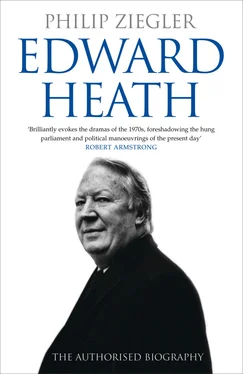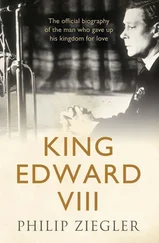His life as a Whip, however, gave him unrivalled knowledge of the strengths and weaknesses of his colleagues. ‘He did know about people,’ Buchan-Hepburn remarked perceptively. ‘He took great trouble to know about them, and their backgrounds and what they wanted…He enjoys people, but I don’t know that he needs them – he’s extraordinarily self-sufficient.’ 19His role as a Whip ensured him a wide acquaintanceship with the Tory members and all their vagaries but also denied him any chance of intimacy. This merely reinforced a predilection that was already obvious, but his new role gave him an obligation to behave in such a way. He did not formally sever his ties with the One Nation Group until the Tories were in power and he found himself on the front bench, but already he had begun to distance himself from their proceedings. The day that he accepted the role of Whip saw the extinction of the last chance that he would ever ‘join a gang’.
He was in one way particularly well suited for the job, because he found the endless grind of House of Commons life perfectly acceptable and had no compelling wish to be elsewhere. He had the advantage of being what was termed in the Commons NHTGT – No Home To Go To. 20His poky flatlet in Petty France, little more than a bed-sitting room, offered few attractions. He would have liked to go to operas or concerts but disliked spending money unnecessarily and was saving every penny that he could; what then could be more appealing than the warmth, light and animation of late night sittings at the House? Ned Carson, a young Conservative MP from Kent, once went into the Whips’ Office after an indecently protracted debate and asked indignantly why Heath did not get married, go home and leave people like him free to go to bed. ‘He looked up slowly, with a very blank face, and answered simply: “I don’t want to get married”.’ Nor did he want to go home, or even particularly to go to bed. His dedication, his self-discipline, his mastery of detail, won the respect of his fellow Members. He was not outstandingly well liked but, as Buchan-Hepburn pointed out, that did not matter much in the House of Commons: ‘Respect is the first thing, and confidence. Popularity comes very much second.’ 21
‘He was shy to start with,’ said Buchan-Hepburn, ‘but quickly developed and became invaluable to me, and I am sure that from his own point of view it was very important for him to have those years in the Whips’ Office – breaking down the reserve, getting on with all and sundry.’ Heath would have agreed. He much enjoyed the organisational role involved in being a Whip. ‘I loathe incompetence, inefficiency, bungling and waste,’ he told Michael Cockerell on television in 1988. Even when he was the most junior of the Whips it was noticeable that the Office functioned more smoothly for his presence; once he had become Deputy Chief Whip in April 1952 procedures were revolutionised. The Whips, if only to be alert to incipient scandal, had always felt it necessary to know a lot about the private lives of the individual members; under Heath procedures were regularised, card-indexes established, the psychological strengths and weaknesses of each member analysed and recorded. The Bromley-Davenports of this world had barked commands and expected unquestioning obedience: Heath relied more upon reason and persuasion. ‘Now be a good chap. It’s not really a matter of your conscience this time, is it?’ was the line Ned Carson remembered him taking. If it really was a matter of conscience he did his best to be sympathetic. As a result, when he did find it necessary to be tough, he was listened to with attention. ‘I remember one occasion when he was stern in a tactful way and I was so surprised I went into the lobby at his bidding.’ The deadpan and slightly black style of humour which was more and more to become his trademark matured during his years as a Whip. His object seemed to be more to disconcert than to amuse; its victim was often uncertain whether Heath’s remarks were intended as a joke or were to be taken seriously. Sometimes both were true. John Peyton, a future minister in Heath’s government, once let off steam to him about the failure of certain ministers to consult interested members about problems which affected them or their constituents. Some months later Heath, as Deputy Chief Whip, asked Peyton whether he would like to serve as a parliamentary private secretary. ‘To whom?’ asked Peyton. Heath looked at him in affected surprise: ‘Do you not feel equally warmly towards all our colleagues?’ 22
It was not only his social life that was circumscribed by his work as a Whip. In 1951 he gave up command of the 2nd Regiment HAC. The historic rituals, the social consequence, the pomp of the Honourable Artillery Company had all appealed strongly to Heath; as well as the unstrained masculine comradeship of the mess and the training camp and the feeling that, as an effective element in the Territorial Army, his unit was making an important contribution to national defence. He knew that he had to retire but deplored the need. The blow was softened when Lord Alanbrooke, Colonel Commandent of the HAC, offered him the appointment of Master Gunner within the Tower of London. The post was almost entirely honorary but it enabled Heath to entertain dignitaries in the grand manner and at small expense and to dress up and preside over the firing of salutes on occasions such as the royal birthday. He relished such opportunities and even endured with equanimity the debacle when on one occasion the ammunition was damp and all four guns failed to fire. At one point the desperate troop commander was reduced to extracting a faulty shell and, for want of a more suitable repository, flinging it into the Thames. It was a singularly courageous action but not one recommended by the drill manuals. The officer concerned could well have earned a stiff rebuke, even dismissal, but Heath and Alanbrooke between them saw to it that the War Office was not troubled by any report of the incident.
More importantly from the point of view of his finances, once he became Deputy Chief Whip Heath felt he could no longer work part-time for Brown Shipley. As a tyro backbencher he had managed to spend most mornings in the City and even as a junior Whip he had kept up more-or-less regular attendance. The arrangement had suited Brown Shipley well: to have a promising young MP on their staff both lent the bank a certain prestige and gave them a potentially useful foothold in Westminster. In the summer of 1951 they had sent him on a visit to the United States and Canada; not to transact any particular business but so that he could get to know how Brown Brothers Harriman, Brown Shipley’s associate in New York, transacted its affairs and to make contact with people who might be useful to him both as a banker and as a politician. One of those he hoped to meet was the influential Senator Paul Douglas from Illinois. A mutual acquaintance wrote enthusiastically to urge the Senator to set up a meeting. Heath, he said, was ‘very able and exceedingly well informed and a very fine guy indeed…He’s much more “liberal” that most of our best Democrats, but withal a genuine and convinced Tory…Recently he’s been made an Assistant Whip which, I’ve just learned, makes him a Front Bencher and, should the Conservatives get in power, very likely a cabinet minister.’ Heath’s rise was not to be quite so meteoric but the judgment is of interest as showing how seriously he was already taken in political circles in the United States. A date was fixed for a meeting with the Senator but before it could take place Heath visited Ottawa, staying at the same hotel as Labour’s foreign secretary, Herbert Morrison, and his parliamentary private secretary, Eddie Shackleton. On 19 September he met the pair of them heading hurriedly towards the exit. ‘Have you heard?’ asked Shackleton. ‘Attlee has just called a general election!’ ‘And the bloody fool didn’t ask me first,’ added a disgruntled Morrison. 23
Читать дальше












